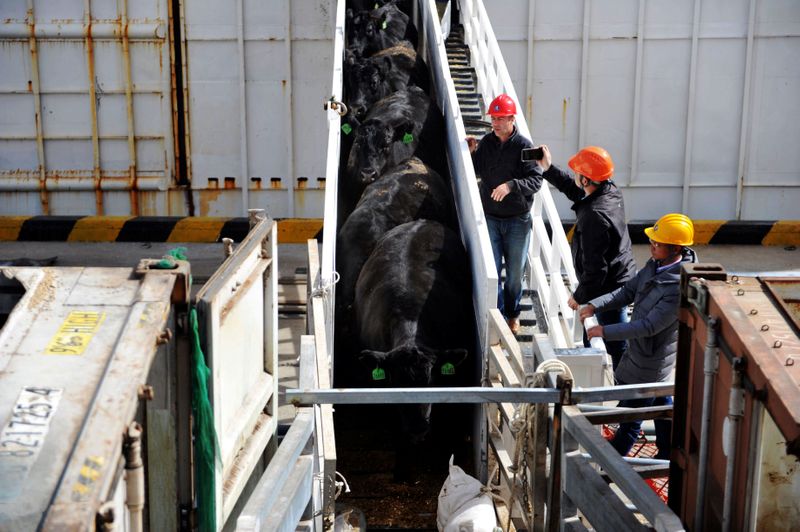By Kirsty Needham and Colin Packham
SYDNEY (Reuters) - China has suspended imports from four of Australia's largest meat processors, Australia's trade minister said on Tuesday, as the trade of several key agricultural commodities suffers in the wake of souring ties.
The suspension comes after Australia last month called for an independent inquiry into the origins of the coronavirus and just days after China proposed introducing an 80% tariff on Australian barley shipments.
Trade Minister Simon Birmingham described the import suspension as "disappointing", but denied it was retribution by China over Australia's desire for a coronavirus inquiry.
China has rejected the need for an independent inquiry, and Beijing's ambassador to Australia, Cheng Jingye, in late April said Chinese consumers could shun Australian goods in response to Canberra's support for such an investigation.
Chinese foreign ministry spokesman Zhao Lijian told reporters the suspension was due to violation of inspection and quarantine requirements and was not linked to the dispute over the call for a coronavirus investigation.
Birmingham said Kilcoy Pastoral Company, JBS's Beef City and Dinmore plants, and the Northern Cooperative Meat Company have been banned from exporting beef to China due to issues with labelling and health certificates.
Labelling issues were also cited by Beijing when the same companies and two others lost their licences to ship beef to China in 2017 for several months.
"Thousands of jobs relate to these meat processing facilities. Many more farmers rely upon them in terms of selling cattle into those facilities," Birmingham told reporters in Canberra.
Australian Meat Industry Council chief executive Patrick Hutchinson said the companies made up approximately 20% of Australian beef exports to China.
Australian meat exporters were aware of Chinese labelling requirements, Hutchinson said.
"Sometimes their tolerance levels go up and down. This time we have a situation where the tolerance is quite low for this issue".
TRADE CONCERNS HIT WEIGH
Worth more than A$3 billion ($1.94 billion), Chinese demand for Australian beef surged in 2019, fuelled by a growing middle class and as consumers switched to eating beef as pork availability fell during a swine fever outbreak which decimated Chinese hog herds.
China is by far Australia's largest trading partner, taking around 38% of all exports in 2019, and the growing spat weighed on the Australian dollar on Tuesday.
"First barley now beef," said Stephen Innes, Chief Global Market Strategist at AxiCorp. "The Aussie has been under pressure most of the day due to tariff issues with China."
JBS said in a statement it was working with Australian officials "to understand the technical issues that China has raised" and would take corrective action.
Kilcoy Pastoral Company, its owner China's New Hope Group, and Northern Cooperative did not immediately respond to requests for comment.
China has committed to increase its purchases of U.S. agriculture including beef under a phase one trade agreement with the administration of President Donald Trump.
U.S growers of corn and sorghum could also benefit should Australian barley exports to China be hit by a big tariff. Barley, like corn and sorghum, is often used in animal feed in China.

Australia is China's top supplier of barley, sending it about A$1.5-A$2 billion of the grain each year. China takes more than half of Australia's barley exports.